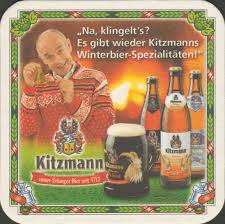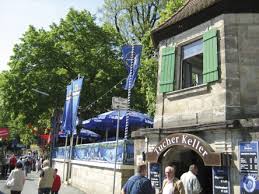
Photo from Steinbach Brewery website
Erlangen, a university town in Middle Franconia (Bavaria), is where I spent over two years serving in the US Army in the 1960s. Later, after several subsequent visits, I wrote a history o the city (Erlangen: An American's History of a German Town") During my research, I found, surprisingly, that up until the early 20th century, Erlangen had been known as quite a city for beer and actually exported some of its products out of the country. Today, that era has long since passed, but I would like to relate here some of the information I included in my book.
Beer-making in Erlangen goes back to the Middle Ages. By 1696, the ciiy's old town (
Altstadt) had 9 breweries operating-principally on and around the Martin Luther Platz. The company that would come to be known as Kitzmann, which today is the oldest-standing brewery in Erlangen, was established in 1712. In 1724, ownership passed to Joseph Vierzigmann, whose name is the most prominent in Erlangen's history when it comes to beer. In 1833, after a succession of owners, it came under the ownership of Johann Lorenz Kitzmann. Today, it is still run by the Kitzmann family and is one of two surviving breweries. Two other notable breweries that lasted well into the twentieth century were Henninger Reifbrau (est 1690) and Erichbrau (est 1718) breweries.

Prior to refrigeration, the city stored its beer in caves built into the Burgberg hillside on the northern edge of town to keep it cool using ice from the Regnitz River, which flows past the town. In 1755, the city began its traditional Burgberg beer fest, the oldest in Germany and arguably after Munich, Germany's most popular. It takes place at the same site during the Whitsuntide season, 12 days during the end of May and early part of June. (
Bergkirchweih) I highly recommend it. During the fest, the recipes of the old Henninger and Erich breweries are revived. The beer is sold right at the entrance to the caves of the Burgberg.


(R) Old Erichbrau building behind
Altstaedter Kirche (Old town church)

Bergkirchweih
During the 19th century, Erlangen established an international reputation for its beer. An important factor was Erlangen becoming part of Bavaria (1810), which meant that it had to conform to the Bavarian Purity Law of 1516 (
Reinheitsgebot). This meant that only three ingredients could be used, water, hops, and barley malt. In addition, Erlangen's brewers switched from an over-fermentation method to an under-fermentation method that was being used only in Bavaria. The final product was a greatly improved beer. By the end of the 1860s, Erlangen was exporting three times the amount of beer as Munich and more than Nuremberg and Kulmbach as well. Even in the US, the term
Erlanger was known for a particular type of beer from Erlangen. I recall back in the 1970s-1980s, when Schlitz came out with a specialty beer called
Erlanger. The results were, predictably, disappointing.
When I was stationed in Erlangen during the 1960s, Kitzmann, Erich, and Henninger were the three breweries in town. By that time, Erlangen had seen its beer companies decline in the early part of the 20th century. Henninger, by the way, was founded by the same man (Heinrich Henniger) who later founded the Henninger brewery in Frankfurt-still that city's major brewery.
Today, Kitzmann is the main brewery in Erlangen. A more recent brewery is Steinbach, which had originally been founded by Carl Steinbach in the 1860s, closed, and re-instituted by the Steinbach family in recent years.

Both companies have drinking and eating facilities at their breweries. The Steinbach brewery on the northern edge of the old town, has a pub at the entrance, a small outdoor beer garden, and a cellar-type restaurant below. Their beer is close to a Hefeweizen taste, somewhat cloudy with a strong hint of lemon.


(above) Steinbach-(below) Kitzmann
The Kitzmann brewery opened an outdoor beer garden and
stube only in recent years. Highly recommended. In addition, during the months where the weather is good, the Niklas Keller (named after an early Erlangen brewery) restaurant at the beer ground site is open. You can sit outside on the benches, eat a meal, and quaff a liter or two of Kitzmann.

Two years ago, when I was attending the beer fest, the hotel where I was staying in nearby Uttenreuth was featuring a recreation of another old local brewery that had disappeared ages ago. I don't recall the name and I don't know if it has continued to operate.
Incidentally, I still own glasses and mugs from Kitzmann, Erich and Henninger which I purchased during my army stint in Erlangen over 40 years ago.





